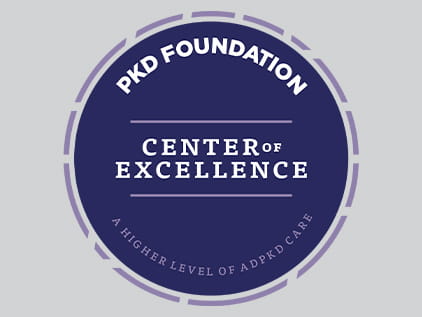Polycystic Kidney Disease (PKD)
Polycystic kidney disease (PKD) affects hundreds of thousands of people in the United States. PKD is a genetic disease that causes fluid-filled cysts to grow in the kidneys. Over time, as the cysts continue to develop, the kidneys enlarge and compress other organs in the body, often causing pain and fatigue.
If you or your loved one has PKD, trust the experts at The University of Kansas Health System in Kansas City as your partners during your PKD care. Our interdisciplinary team can give you information about polycystic kidney disease and offer more treatment options to help you live life fully. Our team provides a full spectrum of excellent care that includes the latest treatments, second opinion services and clinical trials.
What is polycystic kidney disease?
Polycystic kidney disease is a genetic disorder that affects the kidneys, causing uncontrolled cyst growth. PKD affects people differently, and the symptoms and effects can be serious. More than 50% of those who have PKD will develop kidney failure by age 50.
Until recently, dialysis or a kidney transplant were the only treatment options for PKD. Today, an FDA-approved medication called tolvaptan can also be used to help slow the progression of PKD.
We offer a variety of appointment types. Learn more or call 913-588-1227 to schedule now.
Types of polycystic kidney disease
There are 2 types of PKD:
Polycystic kidney disease symptoms and risks
Many people who have PKD go undiagnosed. In the early stages of disease, there are often no symptoms. If signs or symptoms of PKD are present, they can include:
- Blood in the urine
- High blood pressure
- Kidney stones
- Pain in the back or abdomen
- Urinary tract infections
Polycystic kidney disease diagnosis and screening
Our clinicians work closely with you to accurately diagnose, correctly stage and actively monitor the progression of PKD. The specialists on our polycystic kidney disease (PKD) team are experts invested in the proper diagnosis and continued care of people living with PKD. Imaging tests such as an ultrasound, CT scan and magnetic resonance imaging can be used to diagnose and stage PKD.

Living well with kidney disease
Diagnosed with polycystic kidney disease, Jennifer Branch sought the region’s best resources for lifesaving care. She found The University of Kansas Health System, where dedicated caregivers and researchers focus on PKD diagnosis, education and treatment.
Polycystic kidney disease treatment
PKD treatment typically includes a combination of therapies, including lifestyle changes, medications and cyst removal. Management of associated conditions – like hypertension and urinary tract infections – along with dialysis or kidney transplant are also part of PKD treatment.
With the approval of tolvaptan, the first FDA-approved treatment to slow kidney function decline in adults with rapidly progressing PKD, we can now do more and begin intervention earlier. The University of Kansas Health System was among the nation's first providers of tolvaptan. We offer years of experience and study with tolvaptan, including its side effects and dosing process.
Why choose us for polycystic kidney disease?
At The University of Kansas Health System, we are committed to extraordinary, compassionate care. As 1 of only 4 National Institutes of Health-designated PKD research and translation core centers, our PKD physicians offer the most advanced diagnosis and treatment options in the world, including access to the latest clinical trials and treatments to improve the lives of individuals with PKD.
At The University of Kansas Health System, we provide:
- A multidisciplinary approach, including shared care with referring physicians
- A nationally recognized, complete continuum of kidney care, including dialysis and transplant, as well as use of tolvaptan, the first and only FDA-approved medication to treat PKD, slowing the disease's progression
- Board-certified specialists with PKD experience to predict the onset of end-stage kidney failure
- One of the nation's top kidney research facilities, offering research initiatives and clinical trials that bring the latest discoveries to patient care
The Kidney Institute at the University of Kansas Medical Center is an internationally recognized research center that supports basic, clinical and translational kidney research. The institute leads major advances in the prevention and treatment of kidney diseases, including polycystic kidney disease, progressive renal diseases, and disorders of kidney development and metabolism.

PKD clinic named Center of Excellence
The PKD (polycystic kidney disease) Foundation included our multidisciplinary PKD care team on its inaugural list of 28 Centers of Excellence – clinics that offer extraordinary, patient-focused care.
Your polycystic kidney disease care team
Doctors at The University of Kansas Health System are leaders in polycystic kidney disease diagnosis and treatment. They partner with the leading specialists at our Center for Transplantation to provide advanced care for the best outcomes.

Find a doctor
Doctors at The University of Kansas Health System are care providers and researchers at the forefront of new medical discoveries. From primary care to complex conditions, we offer hundreds of specialists.
Polycystic kidney disease resources and support
Our board-certified nephrologists have extensive experience with PKD. In our weekly specialty clinic, these specialists work closely with you to accurately diagnose, correctly stage and actively monitor the progression of PKD.
The PKD clinic is available on Thursdays from 1 to 5 p.m. Services include:
- Clinical trials
- Complete continuum of kidney care
- Diagnosis
- Diagnostic imaging
- Dialysis
- Tolvaptan treatment
- Transplant listing, surgery and continuum of care
Our PKD clinic has regular openings. Physicians may refer patients, and patients may self-refer by calling 913-588-6048.
Dialysis centers
Our multidisciplinary dialysis team includes physicians, registered nurses, dietitians and social workers to provide education and support, and to help you manage your condition and maximize your quality of life.
We offer dialysis for people with PKD at 2 convenient locations:
RAI Dialysis Care Center
6401 Parallel Pkwy.
Kansas City, KS 66102
RAI Dialysis Care Center
4720 Rainbow Blvd., Suite 200
Westwood, KS 66205
Jennifer Branch: My name is Jennifer Branch and I am a PKD survivor, polycystic kidney disease, and I'm also a transplant recipient, kidney transplant. I would want to tell other people who have been diagnosed with polycystic kidney disease that it's definitely not a death sentence, so there's a lot of options, a lot of education available, a lot of good doctors and nurses who definitely know a lot about polycystic kidney disease. The University of Kansas Hospital has helped me through my healthcare journey with having polycystic kidney disease immensely. First of all, I got established with nephrologists there. I have been enrolled in some polycystic kidney disease studies and the research studies have felt so empowered by being able to participate in those studies.
Dr. Franz Winklhofer: My name is Franz Winklhofer. I'm a nephrologist with an interest in polycystic kidney disease. I'll see a lot of patients with very early stage kidney disease, especially polycystic kidney disease, but I take care of patients on dialysis as well. Polycystic kidney disease or PKD is a genetic disorder. It's the most common, potentially fatal genetic disorder. Affected patients will over time develop cysts in the kidneys and they can develop so many cysts that the good kidney tissue is essentially replaced or destroyed and then that leads to the chronic kidney disease and kidney failure. At this time, the treatment or potential treatments for PKD are very limited. The treatment at this point is really focused on trying to limit other risk factors that we know can lead to progression of kidney disease or kidney injury. We started the PKD clinic here a number of years ago because of the just broad range of expertise that we had both in the clinicians as well as the basic scientists who have a strong research interest in PKD.
We see, again, patients in all stages of the disease. The PKD clinic here offers the ability to, first of all, diagnose the disease. We can also give information about prognosis and then obviously we're focused on trying to treat the disease as best we can. We can offer further consultation with other specialists to help interpret some of the results. There's also access to clinical trials. Our program is unique in this area because there, to my knowledge, isn't another clinic that's solely dedicated to PKD patients only. The other thing is that we have not just clinicians but we have researchers that have PKD as their sole focus. We have a wide range of diagnostic imaging that we can use to help clarify the diagnosis. Sometimes we are referred patients who've been diagnosed with PKD and we find out that it's something completely different as well. So I think the just the close focus on polycystic kidney disease and the progression of the disease and the complications are something that we're, I think particularly well equipped to deal with.
Jennifer Branch: I feel like I'm at the best place that I possibly can be with polycystic kidney disease. I like to share my journey with other people. People can live a very long, healthy life with kidney disease. It is definitely something that you can work with people who are very caring, very knowledgeable and very invested in kidney disease and helping people like myself. They're so close to identifying all the genes responsible and coming up with medications and treatments that can help people with polycystic kidney disease.
Dr. Franz Winklhofer: The future for PKD treatment is still bright. There are numerous other targets that potential therapies may become available for. The amount of research that's being brought to bear to try and find a cure is more now than ever.




